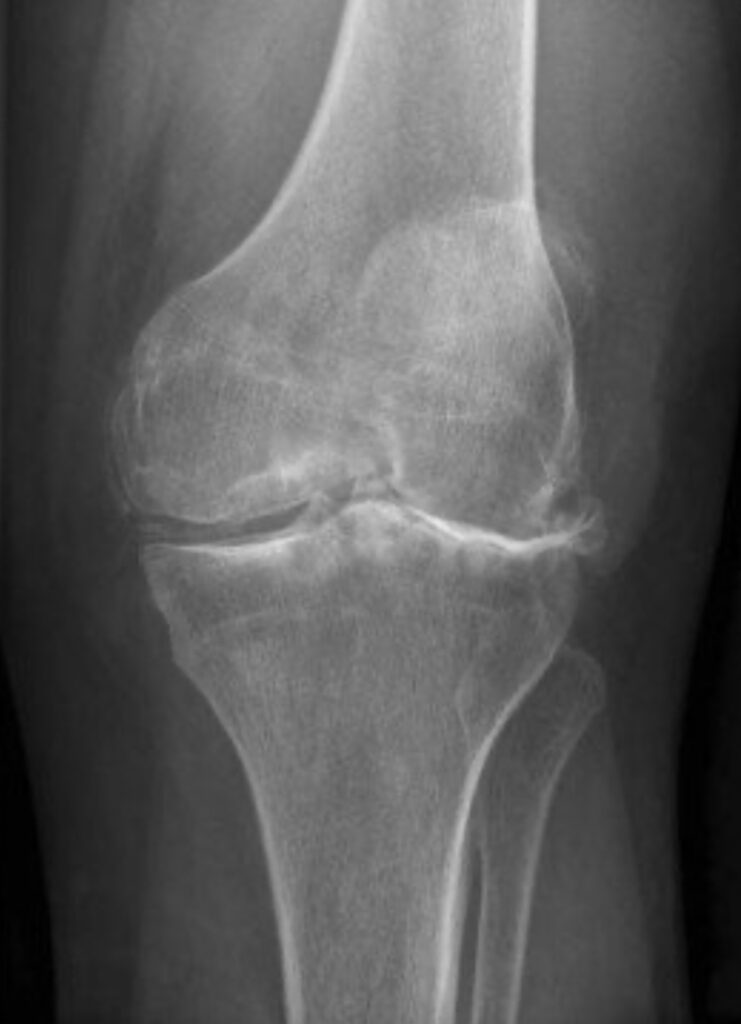Knee osteoarthritis is a progressive disease. And that means that your mobility could be compromised and your symptoms will worsen as time passes. In fact, we classify your osteoarthritis symptoms in four stages. And identifying problems at an earlier stage can help you seek earlier interventions and delay or prevent progressions.

Knee osteoarthritis impacts both joint function and mobility. It is an incurable, progressive disease. Diagnoses come in stages that are dependent on symptoms and joint damage. Early intervention can help your preserve mobility; it may also help prevent or delay progression.
This stage means you have a healthy knee with no symptoms of arthritis. You will not show any signs of joint damage, and won't need any intervention to stay active and pain-free.
Here, knee joints can show signs of minor wear and tear. There may be small signs of bone spur growth on joints, but most stage 1 patients don't experience knee pain. At this stage, you may wish to engage in knee health exercises, as that could help prevent disease progression.
Here, there will be more noticeable signs of bone spur growth on knee joints. While the space between joints should still appear normal, stage 2 knee osteoarthritis is likely to leave you experiencing joint pain and stiffness. (These symptoms will likely be worse after you exercise, sit for extended periods of time, or when getting out of bed in the morning). At this stage of progression, cartilage could also start breaking down. You may be able to manage progression and pain with lifestyle measures. However, you may need additional interventions for relief.
Stage 3 patients display obvious erosion of cartilage and a narrowing of the gap between bones. Joint inflammation causes stiffness and pain, and your knees may pop or make a snapping sound with walking. Pain medications may help with symptom management, but many patients will need to seek additional interventions.
This severe knee osteoarthritis has caused joint stiffness due to significant cartilage erosion. There will also be very little space between your bones, and decreased levels of synovial fluid will lead to pain and friction with joint movement. As a result, once your disease progresses to stage 4, it will be difficult to complete even your simplest daily tasks. In fact, many patients turn to surgical treatment at this stage. But, if you seek medical interventions for stage 2 or 3 knee osteoarthritis, our Georgia Knee Institute team can treat your condition without surgery.
Genicular artery embolization (GAE) is a non-surgical medical procedure. It can slow the progression of knee osteoarthritis, and is a procedure best suited for treating people with stage 2 and 3 osteoarthritis who don't find relief from other, non-surgical interventions. The procedure reduces symptoms by diminishing blood flow to the knee lining. After the GAE procedure, most patients can walk within two to three hours, and usually return to normal activities the next day. Apparent symptom relief usually appears within a few weeks?
Ready to learn more about GAE for knee osteoarthritis? We’re here to help. Click here to request an appointment at the Georgia Knee Institute.

Atlanta
3225 Cumberland Blvd. Southeast, Suite 520
Atlanta, GA 30339
Stockbridge
1035 Southcrest Dr., Suite 220 + 250
Stockbridge, GA 30281
Tucker
1975 Lakeside Pkwy., Suite 300
Tucker, GA 30084
Scheduling
Please contact our dedicated specialists to schedule a consultation today.
2025 Georgia Knee Institute. All rights reserved. Website Design by Healthcare Success